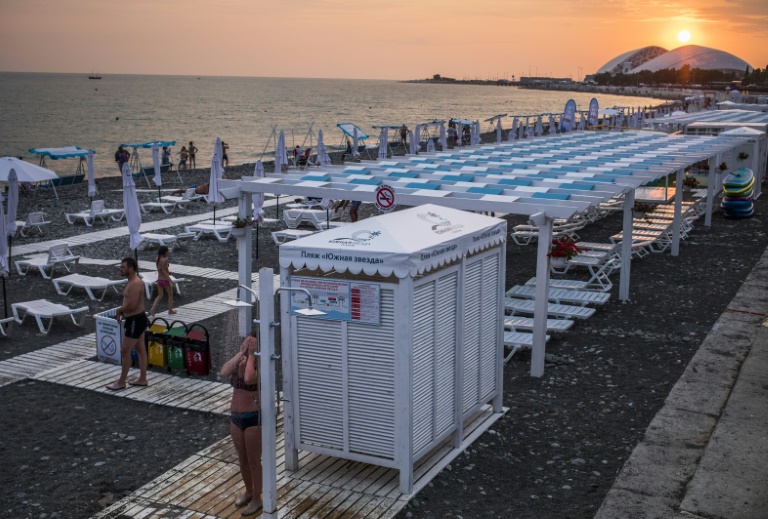World
Sochi Faces Disruptions as Ukrainian Drone Threat Grows

The Russian city of Sochi is experiencing frequent internet blackouts and disruptions to daily life due to an increasing threat from Ukrainian drone strikes. Authorities have sought to shield residents from the consequences of Moscow’s military actions in Ukraine, which began in 2022. As Ukraine intensifies its drone attacks on Russian territory, the situation in Sochi has notably changed, with residents reporting constant alerts and disruptions.
Nadezhda Gorshanova, a 23-year-old sports coach from Sochi, shared her frustrations with the situation. “The last few months have been difficult. We are being constantly disconnected. Usually during the night and morning, there are alerts about drones,” she told the Agence France-Presse (AFP). The increased drone activity stems from a strategic decision by Ukrainian President Volodymyr Zelensky, who has pledged to target Russian energy and military installations. This campaign aims to cut off crucial energy revenues and retaliate against years of ongoing attacks by Russian forces.
The backdrop of the conflict has been catastrophic for millions of Ukrainians, leading to significant loss of life and massive displacements. Air raid alarms are now a daily occurrence across Ukraine, including in the capital, Kyiv, forcing residents to seek shelter as the threat of drone and missile attacks grows. For much of the conflict, Russians outside border regions have remained largely insulated from these experiences. However, with Ukraine’s recent successful strikes deep within Russian territory, this has begun to change.
In Sochi, temporary airport closures have become commonplace, leading to disruptions in flights and occasional travel chaos. Mobile internet access is frequently interrupted to disrupt drone operations, with outages typically occurring between 22:00 and 07:00. “If there is a major drone threat, then it is kept off for longer,” Gorshanova explained. Commuting during these periods can be particularly challenging, compounding the frustrations of daily life.
Situated on the Black Sea coast, Sochi has traditionally been a favored resort for the Russian elite, hosting the 2014 Winter Olympics and events during the 2018 football World Cup. The local airport’s arrivals hall has adapted to the situation, showcasing a painting of a military plane soaring over a field of flowers. During a recent visit by President Vladimir Putin, internet services were largely suspended amid reports of drone activity in the area.
Despite the disruptions, many tourists continue to visit Sochi. Sergei Kamenyuk, a 28-year-old vacationer, expressed that the internet outages could be a blessing in disguise. “Yes, the internet is disconnected. But on the contrary, it’s good. No-one can reach you and you can’t reach anybody either, so you just relax,” he said, while sunbathing on the beach. However, he acknowledged the unusual presence of helicopters and drones overhead, indicating a heightened sense of unease.
As the conflict continues to evolve, the implications for daily life in Sochi and other Russian cities remain significant. The ongoing disruptions highlight the far-reaching effects of the war, even in areas previously considered safe from its immediate impact. With increasing drone threats, the residents of Sochi are left to navigate a changing landscape marked by uncertainty and anxiety.
-

 Science2 months ago
Science2 months agoToyoake City Proposes Daily Two-Hour Smartphone Use Limit
-

 Health2 months ago
Health2 months agoB.C. Review Reveals Urgent Need for Rare-Disease Drug Reforms
-

 Top Stories2 months ago
Top Stories2 months agoPedestrian Fatally Injured in Esquimalt Collision on August 14
-

 Technology2 months ago
Technology2 months agoDark Adventure Game “Bye Sweet Carole” Set for October Release
-

 World2 months ago
World2 months agoJimmy Lai’s Defense Challenges Charges Under National Security Law
-

 Technology2 months ago
Technology2 months agoKonami Revives Iconic Metal Gear Solid Delta Ahead of Release
-

 Technology2 months ago
Technology2 months agoSnapmaker U1 Color 3D Printer Redefines Speed and Sustainability
-

 Technology2 months ago
Technology2 months agoAION Folding Knife: Redefining EDC Design with Premium Materials
-

 Technology2 months ago
Technology2 months agoSolve Today’s Wordle Challenge: Hints and Answer for August 19
-

 Business2 months ago
Business2 months agoGordon Murray Automotive Unveils S1 LM and Le Mans GTR at Monterey
-

 Lifestyle2 months ago
Lifestyle2 months agoVictoria’s Pop-Up Shop Shines Light on B.C.’s Wolf Cull
-

 Technology2 months ago
Technology2 months agoApple Expands Self-Service Repair Program to Canada









